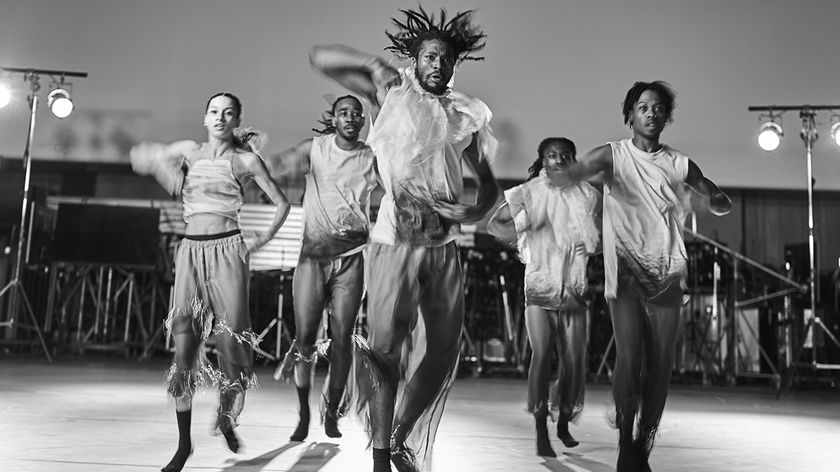“Sometimes people need a mix engineer, or a recording engineer, or a producer, or a guitarist – or sometimes all of those things”: Amy Sergeant on her professional studio career and her approach to mix engineering in the modern industry
The winner of 2024’s Rising Star accolade at the Music Producer’s Guild Awards, Amy Sergeant balances many production roles alongside being an in-studio creative asset
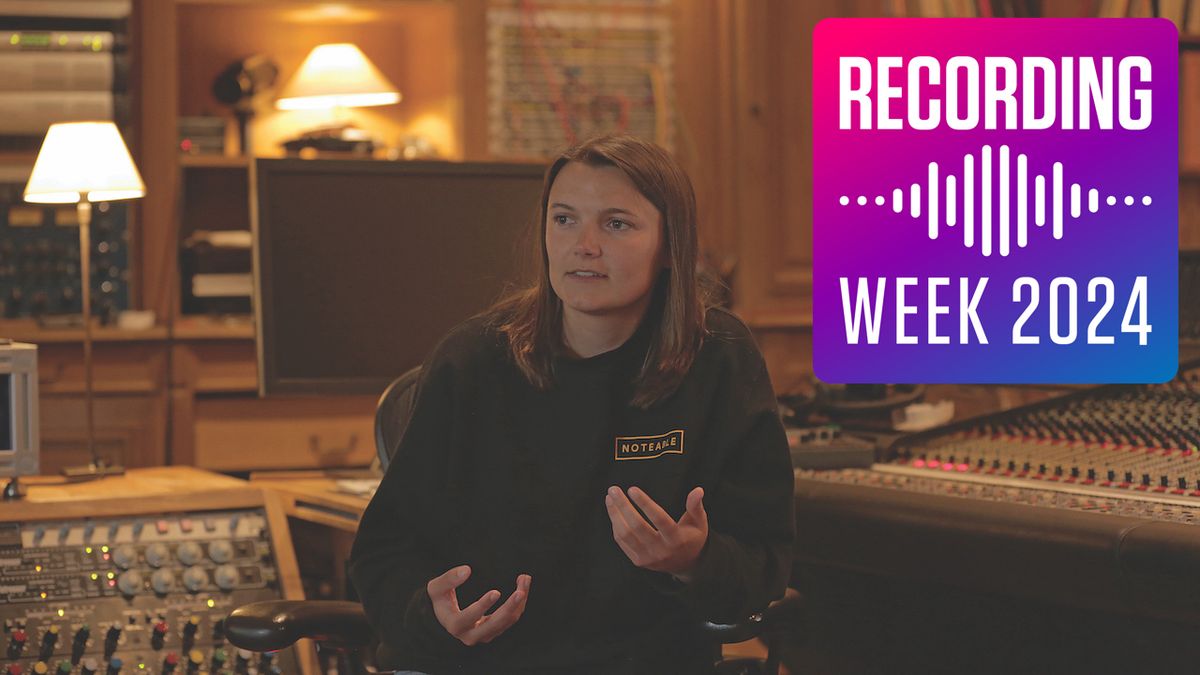
RECORDING WEEK 2024: The MPG Awards have always excelled at celebrating both those legendary studio icons and the rising crop of new production talent in equal measure.
2024's awards, held at London’s The Troxy in April, continued this tradition with the likes of Alan Moulder and Ken Scott scooping the Icon and Special Recognition plaudits respectively. Meanwhile leading the Rising Star charge – and landing that coveted MPG award for the category – was producer, writer and mixer Amy Sergeant.
Based out of her production studio in London (Naughty Cat Records), and specialising in indie-folk and alt-pop, Sergeant has had an impressive decade. She quickly transitioned from assistant engineering for the likes of Florence & The Machine, Wolf Alice and The Vamps to engineering sessions for renowned producers such as Rodney Jerkins, Mark Crew and Hugo White at some of London’s most sought-after studios.
We caught up with Amy and began by asking if she could take us back to the very start of her journey, and just why she gravitated towards music production?
“I think when people make music and pursue it as a career, it often starts when they’re a teenager and just in love with music. I started out by learning guitar, which led to writing songs, which led to me wanting to record them. I thought ‘all these songs exist on the radio, how can I make mine exist?”
Amy continues: “I started out with a little digital 8-track (a Boss BR-600). I’d record different guitar and vocal layers alongside the in-built drum machine, then use the onboard faders to balance the tracks, before bouncing down as to single stereo wav. I didn’t have a computer with a DAW at that point in my life, so I was just on the 8-track for a while.”
It was while at school, that Amy first got the opportunity to get hands-on with a DAW – and where the real focus on production began in earnest. “The first DAW I used was Cubase, then when I was 17/18, I started using Logic and really liked it. I’ve since learned Pro Tools. But that was how I got going initially. From that point on, I would always take on the more technical roles in the various projects I was involved with.
Get the MusicRadar Newsletter
Want all the hottest music and gear news, reviews, deals, features and more, direct to your inbox? Sign up here.
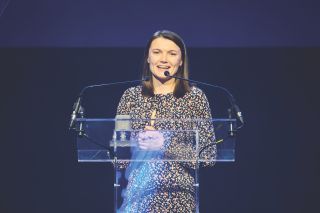
From Bath to the BRITs
With her love of music production growing, Amy opted to continue studying music production academically. She relocated from her hometown of Southend-on-Sea to Bath to attend Bath Spa University’s Commercial Music degree, which led to an integrated masters. “[The course] spanned performance, songwriting, production and business. In the third/fourth years we could specialise in one area and I chose the production path.”
Seeing hundreds of people working without ego, the BRIT Awards was great preparation for the studio environment
It was during this time that Amy’s then-function band were booked to play a wedding, and a fortuitous meeting took place that would give Sergeant the chance to work at one of the British music industry’s biggest nights.
“My band played at a wedding, and the person who booked us was like, ‘Oh you’re into production and tech, you should chat to my brother’. So I chatted to him. His name was Toby Alington, an award-winning live music broadcast engineer. Having immediately sent him an email afterwards, a few weeks later he was putting together a team for the Arianna Grande One Love concert and asked if I would like to work as the audio production assistant. That was my real first insight into the industry and I’ve since been fortunate enough to work alongside Toby at a number of high-profile music events including the BRIT Awards for the past seven years”.
We wonder if, with Amy’s then-software-based workflow, she had to quickly adapt to understanding more about hardware during this ascent into high-level mixing? “Mixing for television is very different to mixing a studio record,” she says.
“The goal is to make the television audience feel like they are at the gig. A big part of that is audience mics placed around the venue, which Toby would mix into the music, and highlight big reactions or singalongs. On a tech level, the methodology, signal flow and gear was very similar to the studio world – other than using a digital desk for easy recalls – so it was great seeing a different application of these tools.”
Amy stayed in the South West after university, working with many Bristol-based artists’ early releases, before moving to London and becoming part of the Miloco Studios team. “Having done a creative degree, many of the projects I was involved with were all based in the South West” she explains. “I was engineering, mixing and doing so much on all these projects – but I’d never really had the chance to shadow and assist on larger scale studio projects with major label artists.
“The desire to keep learning really prompted the move to London. I wanted to be able to get into any studio and have the tools to figure out how everything worked and get a session up and running. That was the biggest thing I got from my time with Miloco. It gave me great confidence working across so many different studios, each with their own setup ready to be tailored for each producer or artists’ requirements.”
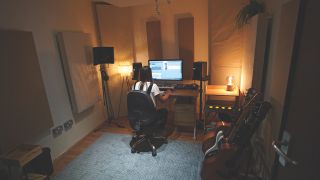
Her previous stint at the BRITs with Toby had proven to be a good warm-up for her new position, which enabled her to assist on projects involving major label artists such as Florence & The Machine and Wolf Alice. “Working on the BRIT Awards and seeing hundreds of people working at the highest level, communicating clearly, cracking on without ego, was great preparation for the studio environment.”
Naughty Cat
Now based out of the Naughty Cat production studio, Amy’s role is a multi-faceted one, serving as both engineer, mixer and producer, as well as a creative assistant, musician and songwriting consultant with the artists she works with.
“The [studio role] lines have really blurred. With so many artists releasing music independently, to be on-board with that and to have a good understanding of that process is vital. I just like to help projects in whatever way I’m useful. Sometimes people need a mix engineer, or a recording engineer, or a producer or a guitarist, and sometimes people need all of those things. I really like that; having a real range of things going on. At the moment I seem to be doing loads of mixing, but at the start of the year I was busy with recording sessions. It goes in waves and I do like that.”
To that end, Naughty Cat also serves as a micro-label. We wonder how that aspect begun? “I noticed that with a lot of the independent music that I was working on, so much work went into the ‘before’, but then the records wouldn’t get the outreach because the focus was on the creating over the marketing. I found indie singer/songwriter Josie Beth through a cover video she posted on Instagram and then added some unsolicited production to one of her original songs on SoundCloud.
“Fortunately, she liked it and asked me to produce her first EP. I thought that, maybe, with the experience I already had with releasing music, I could try to help get her some momentum, and build an audience. I think her songwriting is brilliant and she’s a fantastic singer, which my production style complements, so I just want as many people to hear the tracks as possible.”
It was only last year that the Naughty Cat studio space was set up. “I share the space with James Maltby and Floyer Sydenham from the band St Barbe [whom Amy had co-produced, engineered and mixed for]. We all live together and previously had a set-up in our basement. I could just about stand up and that’s not saying much. It wasn’t right for us – it wasn’t really a workspace. We agreed that if we split the cost of a studio three ways it would be financially viable. Floyer is a drummer/videographer and James is a guitarist/producer. We compiled all our gear and built up the studio from there.”
As well as stocking up with a combination of the gear the three collectively owned, a few more pro additions were procured for Naughty Cat. “All of us have different projects we use the studio for and we continue to invest in equipment to improve our own workflow,” says Amy. “Recently, we got a STAM SA-67 [U67 replica]. Having a great mic set up and ready to go has been so useful for writing and production sessions.”
We’re curious about Amy’s typical working approach, and whether she has any preset mix chains that she typically calls up for projects? “It varies project to project,” Amy says. “I’ve really started to embrace having mix bus processing that’s fairly consistent. It’s not something I’ll switch on straight away. It’s always the same sort of plugins that when I get to a good place in a mix, I’ll switch on and get that little bit closer. I use a lot of the Soundtoys plugins, particularly Decapitator, Microshift and Echoboy – I like that they’re straightforward to use and you can make either subtle enhancements or drastic effects that reshape a sound.”
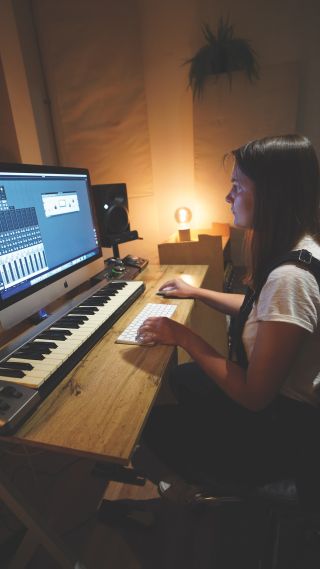
Colour and flavour
We ask if Sergeant is a subscriber to the view that hardware always trumps software emulations, or even if that’s something that really ever concerns her day-to-day? “I’m from the generation where I’ve learned in the box. Plugins were the first experience,” Amy says. “I went from digital recorder to plugins, and then got to experience the original analogue gear. I’ve never sat down and A/B’d emulations to the real thing, and I don’t know if I’m interested in doing that. With plugins, for me, it’s not about trying to sound like the original, necessarily. It’s about having a colour and a flavour. As long as it’s doing the job.
With plugins, it’s about having a colour and a flavour, not to sound like the original
“Something I like to do a lot with mixes that might have been recorded in bedroom studios, with the same interface and microphone, is to run each track through some UAD pre-amp/compressor emulations. I’ll often commit this processing almost like I’m re-recording it into the plugins. It’s not to get the analogue sound because it’s not analogue, it’s just to impart a certain quality. Find the colour and add something to it. Whether that’s what the actual hardware would add to it, I don’t know – but it adds something.”
Amy explains that she typically finds the mixing process to be an easier affair if she hasn’t been involved with the initial production process: “I do enjoy mixing my own productions as I’ve got such a clear vision with how I want it to sound, but early in my career, I think I possibly over-did some tracks by thinking, ‘Right it’s time to mix it now’, when really, the feeling and the mix was probably 90% there. It’s something I worked on, and now very much enjoy mixing as I go. That being said, when I’m brought in on a track solely as the mix engineer, there is something exciting about getting involved that far down the creative process. It can sometimes be easier to be objective about the source sounds and do an instinctive first mix.”
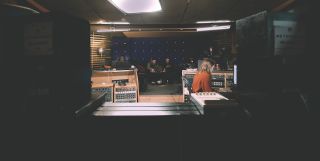
Among the work that she’s most proud of, Amy cites her close collaboration with the aforementioned singer/songwriter Josie Beth. She’s nurtured a close relationship with the Essex-hailing artist over the years. “We worked from the ground up – it’s always evolving. It’s a real team effort. She’s developed an interest in production and she’s making some really cool music. Floyer and James have started playing in Josie’s band as well as on some of her upcoming releases. I’m extremely proud of that on a creative level.”
Sergeant also reflects back fondly on a six-month stint where she was selected to be Spotify’s in-house engineer as part of their EQUAL Residency Program at Metropolis Studios in London. During this time, she engineered the ‘Riffs ‘n’ Runs’ writing camp, and held over 100 sessions with songwriters, producers and artists from across the globe.
An impressive gig, and one that Amy cites as a pivotal one: “The studio was within Metropolis. It was open Monday to Friday and anyone could apply to use the studio for free. With each booking came an engineer, and that person was me. Day to day, I’d run the sessions, but I’d also manage the calendar and have input on what projects came through the studio. They gave me real freedom and ownership on how the studio was run and maintained.”
With her acceptance of the MPG Rising Star award, Amy’s excellent ear for detail has been rightly rewarded. How did it feel to receive this peer-voted accolade? “I said it on the night, but it’s really flattering to be nominated and even more so to then receive the award. I felt really proud of myself.”
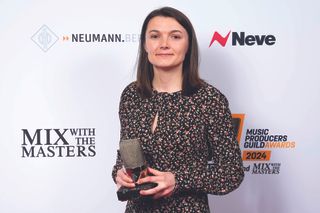
We wonder if, at some point in the future, Amy might be planning to step fully into the sole producer role? “I don’t think about it too much,” she reasons. “I just keep on doing what feels right at the time. I’m always looking for the next project – whatever that might involve. I really like the idea of having a couple of projects that I’m heavily involved with, in multiple capacities. Someone I really look up to is Jeremy Most. He’s an American musician and producer and has co-written/produced a number of Emily King records, as well as performing with her, too. That sort of thing would appeal to me, with the right music and the right artists.”
Now that her position as an in-demand engineer and producer has been fully established and cemented by her MPG win, Amy’s credit list will undoubtedly continue to grow. It’s an enviable position to be in, in these competitive times, and we wonder if Amy has any advice for anyone reading who might be trying to make inroads as an engineer/producer in the fraught music production industry landscape of 2025?
Amy’s central advice is to explore and work out where your own niche is – and develop it: “Firstly, work out what you enjoy doing and what you’re good at. I played in bands, wrote songs, did a bit of live sound alongside developing my music production skills. Working in studios can have long and anti‑social hours, but having experienced lots of different roles, I knew it was where I wanted to focus my attention.”
For more information on Amy Sergeant and her full production credits, head to her official website.
• Get more recording stories and features at Recording Week 2024 here!



I'm the Music-Making Editor of MusicRadar, and I am keen to explore the stories that affect all music-makers - whether they're just starting or are at an advanced level. I write, commission and edit content around the wider world of music creation, as well as penning deep-dives into the essentials of production, genre and theory. As the former editor of Computer Music, I aim to bring the same knowledge and experience that underpinned that magazine to the editorial I write, but I'm very eager to engage with new and emerging writers to cover the topics that resonate with them. My career has included editing MusicTech magazine and website, consulting on SEO/editorial practice and writing about music-making and listening for titles such as NME, Classic Pop, Audio Media International, Guitar.com and Uncut. When I'm not writing about music, I'm making it. I release tracks under the name ALP.

“He was like, ‘You’ve got it all wrong, man": Mumford & Sons reveal what Neil Young told them about the way they were approaching their live shows and album recordings

How to write a ‘sticky’ hit: Pure luck can put you in the charts, but sticking around to make the big bucks needs pure science










